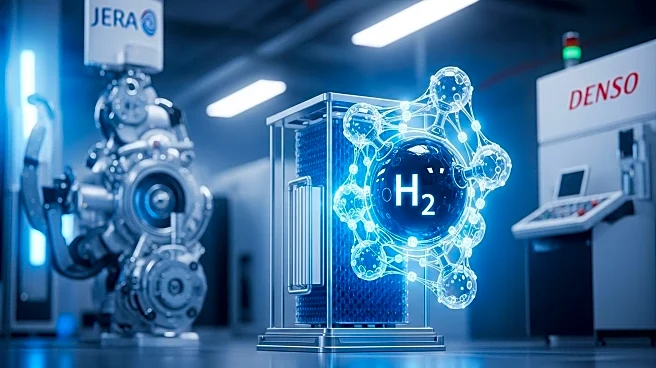What's Happening?
Japanese utility giant JERA and automotive technology firm DENSO have initiated Japan's first demonstration of hydrogen production using solid oxide electrolysis cell (SOEC) systems at JERA's Shin-Nagoya Thermal Power Station. The project aims to achieve hydrogen production with high electrolysis efficiency by applying DENSO's heat-management technology to minimize heat discharge. This marks Japan's first attempt to integrate hydrogen production within thermal power infrastructure, as utilities seek new revenue streams while advancing decarbonization goals. The SOEC system operates at high temperatures using advanced ceramic membranes to split steam into hydrogen and oxygen, leveraging high-temperature steam electrolysis for higher electrical efficiency compared to conventional techniques.
Why It's Important?
The demonstration represents a significant step in Japan's efforts to achieve net-zero CO2 emissions by 2050, as outlined in JERA's roadmap. By integrating hydrogen production into existing thermal power infrastructure, JERA and DENSO are advancing the practical application of next-generation fuel production systems. This initiative could lead to the development of a global supply chain for green hydrogen and ammonia, contributing to global decarbonization and energy solutions. The project also highlights the potential for hydrogen as a clean energy source, which could transform energy production and consumption patterns in Japan and beyond.
What's Next?
Based on the results of the demonstration testing, JERA plans to scale up the electrolysis power from 200 kW to several thousand kW, accelerating efforts to drive the practical application of SOEC systems. JERA's hydrogen ambitions extend beyond the SOEC pilot, with plans to co-fire ammonia at its coal station and pilot hydrogen co-firing at a liquefied natural gas plant. Additionally, JERA is collaborating with ExxonMobil to explore equity participation in a low-carbon hydrogen and ammonia complex on the U.S. Gulf Coast, aiming to establish a global supply chain for clean ammonia.
Beyond the Headlines
The integration of hydrogen production within thermal power infrastructure could have broader implications for energy policy and industry practices. It may encourage other utilities to explore similar initiatives, fostering innovation in clean energy technologies. The project also underscores the importance of international collaboration in addressing global energy challenges, as JERA's partnership with ExxonMobil demonstrates the potential for cross-border cooperation in developing sustainable energy solutions.










